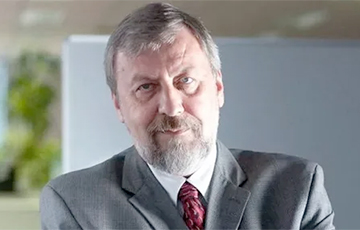Andrei Sannikov: Lukashenka Would Rather Ask For NATO Membership Than Choose To ‘Negotiate’
10- 5.12.2023, 14:15
- 27,106

Only growing and tough sanctions will save the lives of political prisoners
Andrei Sannikov, the leader of the European Belarus Civil Campaign and the 2010 Belarusian presidential candidates, commented on the appeal by the Tsikhanouskaia’s so-called “Coordination Council” for negotiations with the Lukashenka regime:
“Any demands addressed to the dictatorial regime are simply ridiculous without external pressure, especially demands for the release of political prisoners.
Not sham sanctions but only real ones and also pressure make it possible to achieve freedom for prisoners of the regime.
SANCTIONS are neither a strategy nor a pattern for regime change. They are necessary to save people's lives. Growing and tough sanctions will save the lives of political prisoners, while soft or formal sanctions allow the regime to cripple and kill people in prisons and colonies with impunity.
THE TASK and moral duty of the opposition is to demand the imposition of sanctions to release all political prisoners and stop repressions. Any other demands are either false or third-rate.
THE TASK of the regime and its special services is to achieve the lifting of sanctions by any means, including through its agents in the West and lured Western politicians.
The point of the sanctions (and not the strategy of changing power) is to release political prisoners and stop repression. This requires unity of opinion among the opposition on this issue and consistency of the West in pursuing a policy of imposing and lifting sanctions.
After the suppression of the 2010 Uprising, we almost succeeded in getting a coherent sanctions policy from the West. Even though some “opposition” figures travelled to the West with persuasion not to put pressure on Lukashenka, the European Union quickly imposed sanctions and pointed out reasonable and realistic conditions for lifting the sanctions. Economic sanctions have been imposed for the first time. Almost all the political prisoners were released. The last of those convicted in 2010 was released in 2015, Mikalai Statkevich. There was hope that for the first time, the West would show firmness and consistency in its sanctions policy.
Alas.
The European Union lifted sanctions from the criminals, the very ones on whom this regime rests, hypocritically referring to the rumours about “liberalization” heard from “opposition” circles.
The suspension of sanctions against the regime in 2015 and their lifting in 2016 paved the way for the horrific current repression. Thanks to the lifting of sanctions, the regime became convinced of its impunity and significantly strengthened its repressive security establishments, including thanks to European and overseas gear, technologies, and uniforms, which came in handy during the break-up of peaceful protests and the killing of the protesters.
Any attempts to say that sanctions are ineffective, that we need to look for other ways, such as negotiations, are not just a scam, but also open complicity in crimes against the people, against political prisoners. All such “discussions” are inspired by the special services through their agents and pursue only one goal: LIFTING OF SANCTIONS FROM THE REGIME WITHOUT RELEASE OF ALL POLITICAL PRISONERS.
Proposals about “negotiations” look especially funny. Well, agent handlers don’t negotiate with agents. Lukashenka would rather ask for NATO membership than choose to “negotiate”.
Moaning about the suffering of the people due to sanctions is another hypocrisy. Dictators always shift on the people all external and internal economic woes.
The people are bearing the unbearable burden of maintaining the repressive apparatus and militarization of the country even without any external sanctions today. Sanctions are at least to some extent capable of reducing the resources for the regime’s criminal actions against citizens.
We are talking about impunity for dictators for the most terrible crimes related to murders, kidnappings of children, and torture in prisons today.
Internal means of combating this impunity in dictatorial regimes have almost been exhausted, therefore the international community, primarily in the West, has a responsibility to bring criminals to justice, including through sanctions.











